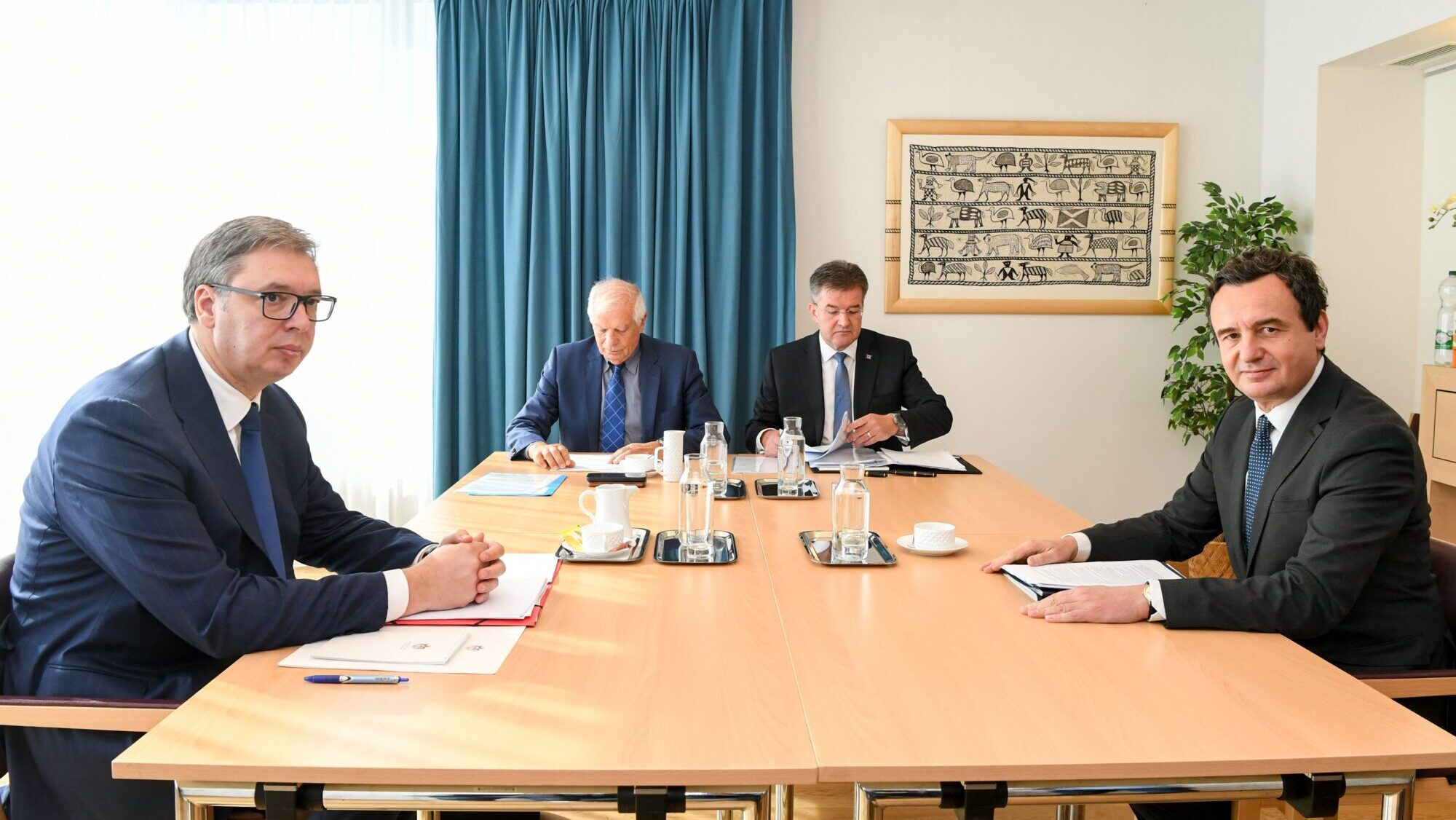
Kosovo’s Prime Minister Albin Kurti and Serbian President Aleksandar Vučić on either side of the table during the negotiations led by Josep Borrell.
Photo: Joseph Borrell / Twitter
Under the auspices of EU foreign chief Josep Borrell, the leaders of Kosovo and Serbia met for what turned out to be a fruitless attempt at reconciliation in Brussels on Thursday, September 14th.
Kosovo—home to a considerable minority of ethnic Serbs, primarily in its northern region—unilaterally declared independence in 2008, a state of affairs Serbia deems unacceptable. The two entities’ relationship has been strained ever since.
The meeting between Kosovo’s Prime Minister Albin Kurti and Serbian President Aleksandar Vučić was their first face-to-face encounter under the EU-facilitated Belgrade-Pristina dialogue process since last May’s violent clashes between ethnic Serbs and NATO peacekeepers in North Kosovo. The talks are the latest attempt to calm down relations between the two rival nations.
Speaking to reporters afterwards, EU foreign chief Josep Borrell, who is striving to implement the EU-brokered Ohrid Agreement, which aims to normalize relations between the two republics, said they had “tried hard,” but that “unfortunately, it was not possible to bridge the differences today.”
"We tried hard, but unfortunately, it was not possible to bridge the differences today."
— European External Action Service – EEAS 🇪🇺 (@eu_eeas) September 14, 2023
Belgrade-Pristina Dialogue: Press remarks by HR/VP @JosepBorrellF after the High-Level meeting with Prime Minister Kurti and President Vučić👇https://t.co/9viX1QYB50
A key condition for Pristina, which Serbia is unwilling to grant, is that the latter start towards officially recognising Kosovo’s independence, including mutual recognition of documents.
Belgrade, however, envisions the creation of an association of 10 Serb-majority municipalities in Kosovo, so that the rights of the Serbs living there would be better protected.
“We have applied repeated efforts to facilitate a compromise on what the implementation process would likely look like,” Borrell told reporters.
“We proposed what we see as the only possible compromise today—a process that would allow this to run in parallel,” he said, adding that the EU and the wider international community, including the U.S. [which among all UN Security Council members, together with the UK and France, supports an independent Kosovo, while Russia and China do not], saw this as the “only realistic way the implementation can work.”
Kurti had rejected this proposal, Borrell said, even though Vučić agreed to it.
Due to the current impasse, Borrell said this would impact both governments’ aspiration for EU accession.
“Without normalization, there will be no European future for Serbia and Kosovo. They risk being left behind when other partners move quickly towards the EU,” he said.
Serbia became an EU candidate in 2012 and opened accession talks in 2014, while Kosovo has yet to file such a request.
Pristina claims the EU version of what transpired during the talks was incorrect.
Speaking to reporters after the meeting, Kurti said he had previously proposed “a sequenced roadmap [which he later posted on X, formerly Twitter] for the implementation of the Brussels and Ohrid Agreement” and rejected what he said was “old conditionality” by Belgrade.
This is the sequencing plan for the implementation of the Basic Agreement I proposed today in Brussels. It was the only proposal on the table. pic.twitter.com/Uv3NH6OuTr
— Albin Kurti (@albinkurti) September 14, 2023
Accusing the EU mediators of being biased, he said the bloc had adopted Serbia’s position as its own.
“For me, the conditionality of Serbia has turned into the position of the [EU dialogue] facilitator [European Union Special Representative for the Belgrade-Pristina Dialogue Miroslav] Lajčák and to move forward this must be overcome,” Kurti said.
Vučić, for his part, said that while Serbia “accepted an EU compromise proposal, Kurti did not want to accept it and the meeting concluded.”
“It is clear that Kurti is simply avoiding the formation of the Association of Serbian [majority] municipalities, he noted, adding that, to Belgrade, “this is the essence of everything,” and that “Serbia does not run away from its obligations.”
